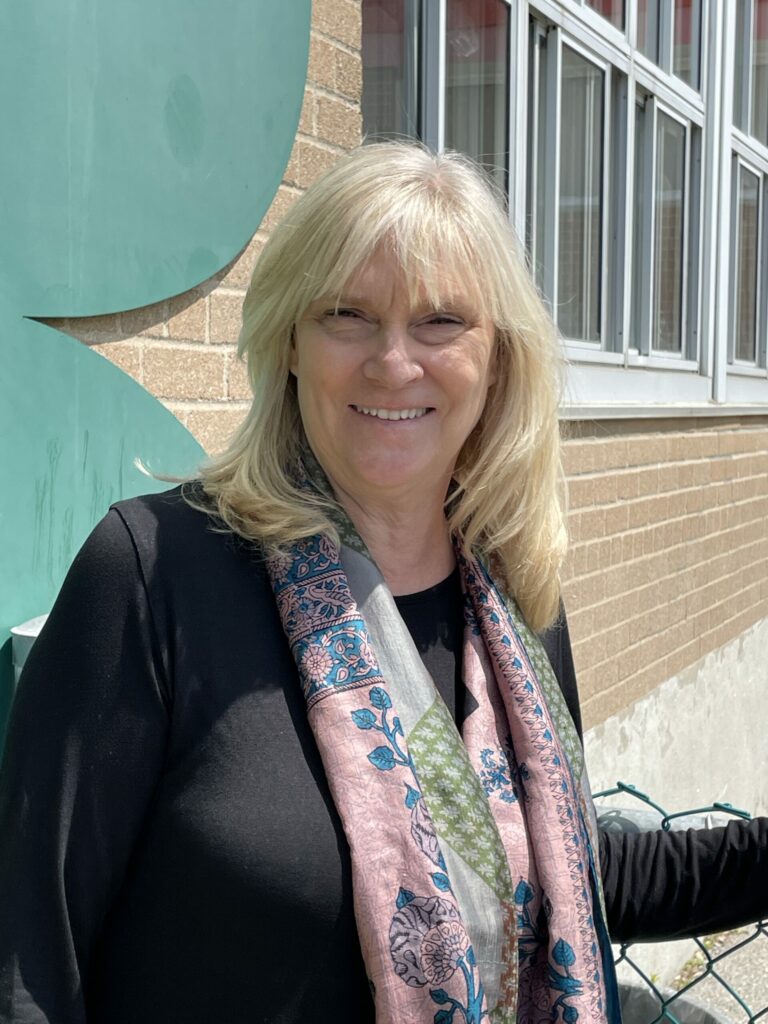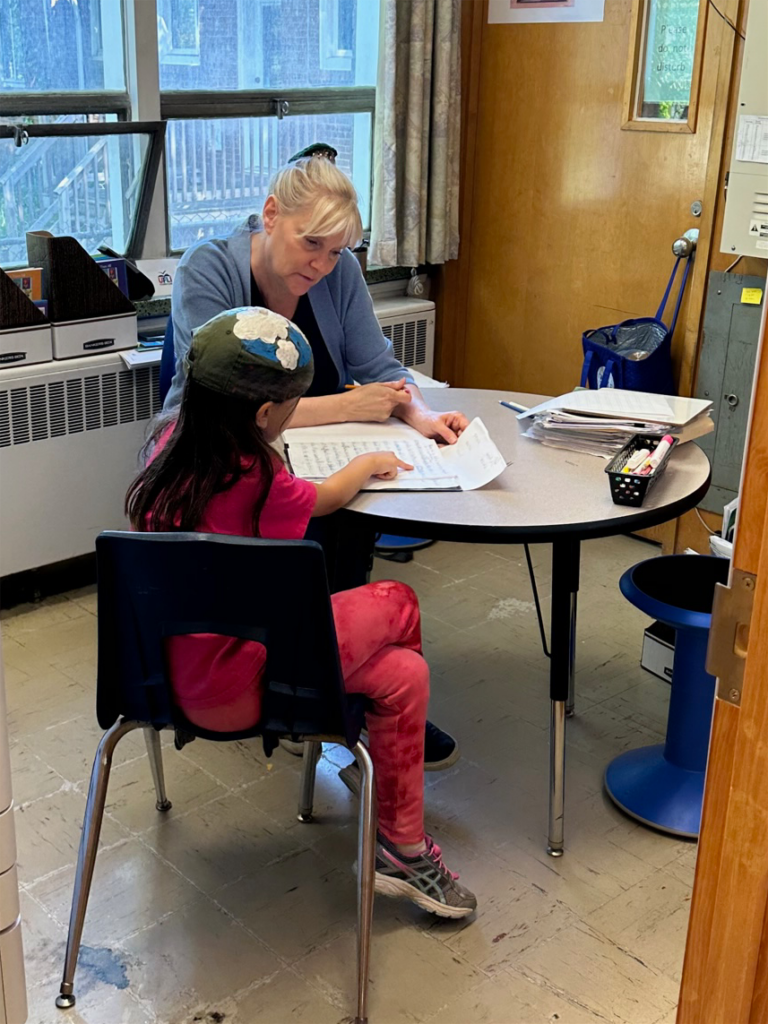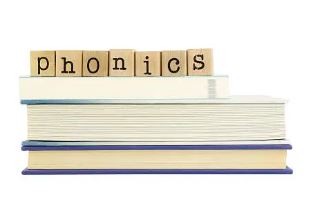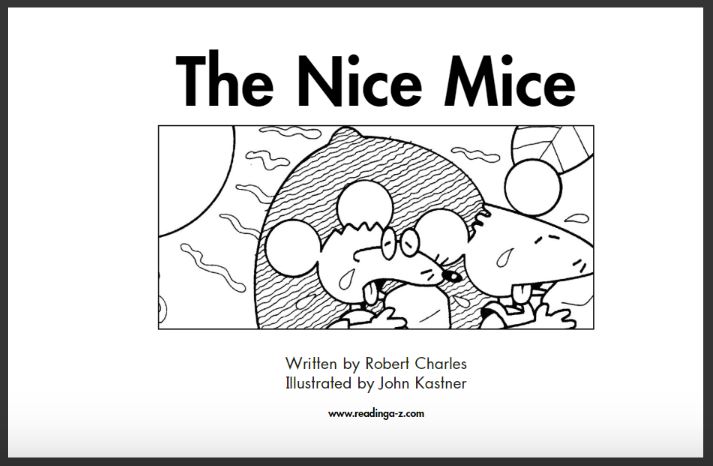In this edition of Meet the Community, we are profiling Michelle McGowen, our Early Years Literacy Teacher, who enlightens us about her work with students at The Toronto Heschel School.
Heschel Hive (HH): Michelle, how long have you been working at Heschel?
Michelle McGowen (MM): I have been working at Heschel since late Fall of 2021. I began as a volunteer, and things progressed into a job as Heschel’s Early Years Literacy Teacher.
HH: What is your educational background?
MM: I have an Ontario Teaching Certificate (OCT) in Primary/Junior education with additional qualifications in Reading, Special Education, and Teaching English Language Learners. I have a Master’s degree in Applied Psychology and graduated with a specialization in Guidance and Counseling. I also did a number of Master’s level courses related to language teaching, including assessment and programming for written language difficulties and children’s literature.

HH: What are your responsibilities at the school, and how has your role evolved since you started here?
MM: At first, I was assessing students and providing individual and small group assistance with reading and writing with students from kindergarten to Grade 2. I’m still doing quite a bit of that.
I’m also working in the Early Years classrooms as we implement direct phonics instruction as part of our integrated curriculum.
HH: Do all students get assessed, or is it by teacher referral?
MM: All students in JK to Grade Two will have literacy screening at developmentally appropriate points during the school year. We will complete more in-depth assessments as needed. Teachers may also refer a student as needed. I also work closely with Haviva Davids Diena, the Speech and Language Pathologist, and Morah Tzvia Eisenberg, Student Support Coordinator for grades 1 to 3.
HH: How much of your work stems from challenges arising during the past COVID lockdowns compared to what you would normally see?
MM: COVID and subsequent lockdowns have had a significant effect on our children from an educational perspective. Many young children have not had as many experiences both in and out of the school context. These experiences are important in building the vocabulary, background knowledge and skills that are integral to literacy learning. Going forward, teachers and parents will need to support children as they grow and learn and patiently fill in the gaps as necessary.
HH: Tell us about the structure of your work. How much time is spent with full classes vs small groups vs individuals?
MM: My schedule varies depending on the time of the school year and the needs of the students. Early in the school year we are focused on screening and assessment of students so that we can begin giving extra literacy support as appropriate. Once this is done, more time will be devoted to supporting classroom literacy programs in addition to individual and small group support. Then over the coming months, we will go back to screening and assessment.
HH: What methodologies do you use to help a child with reading difficulties?

MM: We use evidence-based approaches to support literacy learning. Extra support may vary from the classroom approach depending on how the student best learns.
We do a variety of things to assess. We’re using some standard curriculum-based, skill-based testing tools. So, we’re looking at whether the students are able to sound out or read words. If they’re younger, we’re looking at whether they can identify the letters in the alphabet, and if they can identify the sound that is connected with each letter. Then, for each grade level, we put together an assessment package that will help us understand a student’s current level of literacy achievement .
Once we have an assessment package completed for a student, we analyze it and come up with a plan, if appropriate.
HH: Do you work on writing skills as well?
MM: Reading and writing are reciprocal processes. Students who learn to write and spell well will usually be better readers.
When I’m providing extra support to kids, I’m getting them to write words, mostly for spelling and spelling patterns. They’re going to need to be able to spell and it helps to solidify the concepts if they are writing them as well as reading them.
In terms of the actual instruction, it’s direct phonics instruction, moving to text reading and, eventually, depending on where they’re at, moving from having kids read decodable, phonics-based text to reading authentic text and being able to decode in a more mature process as we are moving up into Grade 2.
HH: What should parents understand about your work? Are there any misconceptions about what you do? Actually, do you have direct contact with parents?
MM: Yes, I talk with parents when reviewing the results of screenings, assessments and next steps. Communication is ongoing as updates are provided and suggestions are given about what parents can do to support at home.
HH: What advice can you share with parents who are concerned that their children may not be reading at the appropriate level?
MM: Parents of students in JK to Grade Two who have concerns should start by speaking to their child’s classroom teacher. I am also available to talk with parents who have concerns.
HH: What is the approach to teaching children who are behind in their reading skills?
MM: We’re at a little bit of a crossroads in terms of what we’re giving kids to read, because the whole conception of the levelled readers that we have had for such a long time is being called into question. This is especially true when we are looking at beginning reading instruction. Many people in the educational community have gone through a shift in the way we think about beginning reading instruction. The focus in the past was on balanced literacy, which did not indicate systematic instruction of phonics. It’s not that phonics wasn’t taught, it just wasn’t in the systematic, we’re-going-to-go-through-each-letter approach that we now see as beneficial. There is still a place for levelled books because once we’ve gotten to a certain point with direct instruction of phonics, students should be able to read authentic text, and levelled books would be considered authentic.
MM: We’re at a little bit of a crossroads in terms of what we’re giving kids to read, because the whole conception of the levelled readers that we have had for such a long time is being called into question. This is especially true when we are looking at beginning reading instruction. Many people in the educational community have gone through a shift in the way we think about beginning reading instruction. The focus in the past was on balanced literacy, which did not indicate systematic instruction of phonics. It’s not that phonics wasn’t taught, it just wasn’t in the systematic, we’re-going-to-go-through-each-letter approach that we now see as beneficial. There is still a place for levelled books because once we’ve gotten to a certain point with direct instruction of phonics, students should be able to read authentic text, and levelled books would be considered authentic.

For example, I just did a lesson with the Grade 1 students about long “i” specifically, “i” with a consonant and an “e” at the end, and what the “e” does to the “i.” We did two very specific, direct lessons on the silent “e” and, in this case, the “i.” So the book that I would give them to read is a phonics-based book called “The Nice Mice.” The nice mice, Mike and Spike, like to ride bikes and dine. You can see how the students would get a lot of reading practice with the phonics concept that I just taught them. “The Nice Mice,” however, is not authentic text because the words that it contains are limited to the phonics patterns that have been taught. They are designed to help students practise that phonics pattern. Levelled books would be closer to authentic text, because while they control for vocabulary a little bit, they don’t control for phonics, they contain words that would not be decodable for a beginning reader. We’re transitioning away from giving very young children books that are not decodable. Beginning readers should for the most part practice reading books that contain the decodable phonic patterns that they have been taught. We want to encourage our early readers to use a phonics first approach to solving unknown words. We don’t want them to guess a word based on the picture in the book. Rather, we want them to be able to read the word because they know the letter sounds. They may confirm that the word is correct because it makes sense in the story, but they are not just guessing.
We understand from the research—and it’s not new research, it’s just research that has become much more prominent to educators, particularly in Ontario—that beginning readers should be taught using a phonics-first approach. Many children will learn to read, with whichever approach, but providing a systematic phonics program is more likely to develop the foundational skills that are necessary for long term literacy success.
HH: So, we’d like to learn a little bit about you. What was your best class in school when you were a child?
MM: When I was in high school, I liked Drama and History.
HH: How did you feel about English at the time?
MM: I liked it very much in the later years. I loved learning about literature. But I actually had difficulty learning to read as a younger child. Perhaps that is where my passion for this work comes from.
HH: Ending on a fun note, you can visit any fictional time or place. Which would you pick?
MM: I might want to work on a Starship for a while.
HH: What about that appeals to you?
MM: In Gene Roddenbery’s world in Star Trek: The Next Generation, they make references to advancements in health, science, peace initiatives and even simple challenges of daily living. They speak as if the difficulties we face today or faced in the not so distant past are ancient history. The show is hopeful about the future of humanity.

About This Column
Our Meet the Community blog column gives Heschel families the opportunity to get to know some of the people who make a difference at The Toronto Heschel School.
Browse Column Archive










